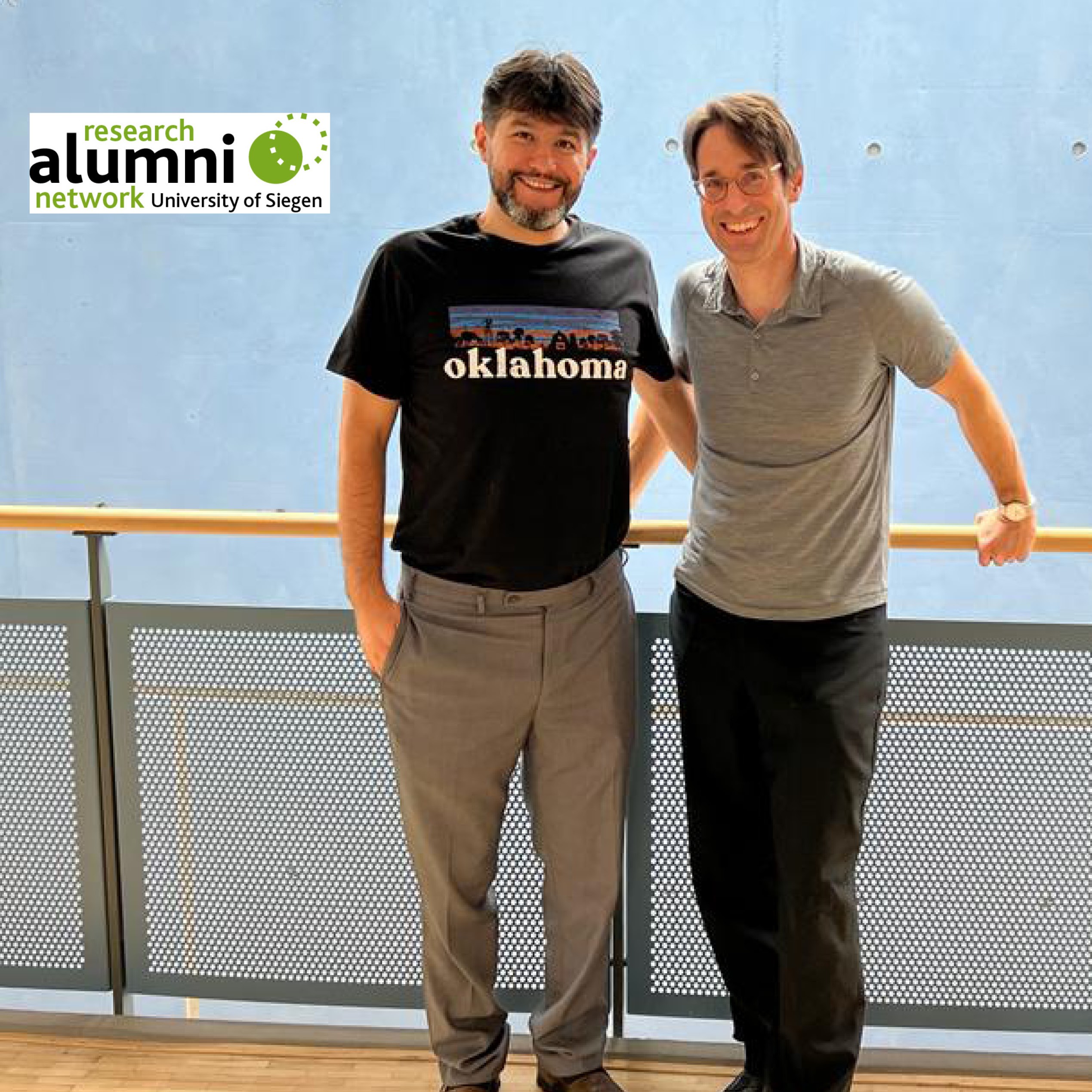- Alexander von Humbold-Stiftung prämiert Konzept zur Vernetzung der Forscher-Alumni
- Forscher-Alumni im "Querschnitt 5/2016"
- Forscher-Alumni im "Querschnitt 4/2017"
- Forscher-Alumni im "Querschnitt 1/2018"
- Forscher-Alumni im "Querschnitt 2/2018"
- Forscher-Alumni im "Querschnitt 3/2018"
- Forscher-Alumni im "Querschnitt 1/2019"
- Forscher-Alumni im "Querschnitt 2/2019"
- Forscher-Alumni im "Querschnitt 3/2019"
- Forscher-Alumni im "Querschnitt 1/2020"
- Forscher-Alumni im "Querschnitt 2/2020"
Dr. Kazim Topuz - Prof. Dr. Christoph Strünck
Using digitality to improve our healthcare system
Prof. Dr. Christoph Strünck, dean of the School of Life Sciences at the University of Siegen, is a social scientist. Dr. Kazim Topuz serves as an Assistant Professor specializing in Business Analytics and Operations Management at the Collins College of Business, University of Tulsa, located in Tulsa, Oklahoma. Together, they conduct interdisciplinary research into our healthcare system.
Dr. Topuz specializes in the intersection of data science, explainable AI, and healthcare. His work focuses on utilizing probabilistic graphical network modelling to decipher complex healthcare data, ensuring these advanced models are not only powerful in prediction but also transparent and interpretable. This approach is crucial in healthcare, where the rationale behind AI-driven decisions is vital for patient care. Topuz's research is pivotal in bridging the gap between intricate data science methodologies and their practical applications in the medical field, enhancing both the reliability and usability of AI in healthcare analytics. Strünck and his team can then use this data analysis and draw concrete conclusions from it.
The cornerstone of their partnership canters on advancing and refining digital healthcare systems. Strünck elaborates, "Utilizing Kazim's sophisticated modelling techniques, we can analyse data effectively, gaining insights into the operational successes and shortcomings of Germany's healthcare system.” The deployment of digital healthcare frameworks significantly enhances the capability for sustained patient surveillance. This technological advancement permits a detailed and targeted analysis of specific health indicators. For example, physicians are now able to track a patient's blood pressure over extended periods with greater precision, contributing to the refinement of risk assessments. Fundamentally, the primary objectives of digital healthcare lie in meticulous patient monitoring and accurate diagnostic processes. Beyond these core functions, the realm of digital healthcare is progressively incorporating treatment modalities, utilizing advanced digital tools to provide comprehensive patient care.
Between rural healthcare deficiency and physical optimisation
All of this is particularly important for rural areas, such as those around Siegen. Strünck emphasises that, at the moment, we do not have the quality of healthcare services to ensure that patients in very rural areas have the same access to top-quality medicine. Digital tools could help us get a diagnosis very early and get a kind of monitoring where the results are also more reliable. The more data we have, the more data we use, the more accurate the solutions can be for patients. And that is the good thing about digital healthcare. It is traditional healthcare supported by additional digital data and technologies. Furthermore, digital applications extend beyond clinical settings, encompassing health management in everyday life. Fitness applications, for example, represent a segment of digital health tools. Many of these apps employ AI technology to tailor personalized training regimens. With the ongoing advancements in AI, we can anticipate a surge in such digital health applications offering diverse functionalities. This is particularly vital in rural areas, where access to traditional healthcare might be limited, and digital tools can play a crucial role in bridging the gap.
Interdisciplinary insights
The basis of the cooperation to digitally improve the healthcare system was laid at a pop-up university in Tulsa in 2022. Rather by chance, the two scientists met, recognized shared research interests, and quickly decided to work together. Thus, the collaboration between the School of Life Sciences and the University of Tulsa was born. In June 2021, Dr. Topuz visited Prof. Strünck at the University of Siegen, focusing particularly on microbiome data processing. During this visit, Topuz presented his research on explainable AI and machine learning in healthcare, engaging with researchers from the School of Life Sciences. Reflecting on his collaboration, Topuz notes, "Strünck and his team specialize in microbiome data. Initially, I needed time to familiarize myself with the genomic data and its impact on gut health, a field I'm eager to delve into. Their team has extensive knowledge in genomics, whereas my expertise is in data analysis. This synergy is extremely beneficial, allowing me to assist them in harnessing the data effectively and extracting meaningful insights. Collaborating with such esteemed scientists in this field is invaluable.”
Other projects are already in planning: together with a consultancy company that has access to special data, the aim is to improve treatment for cancer patients. The data already shows that people in one region are treated very differently for cancer. To achieve greater accuracy, patient data and disease progression are meticulously reconstructed and integrated into AI-driven models. This process aims to develop a predictive model. The AI's capability to identify intricate patterns, which might initially elude human detection in statistical analyses, is a key advantage. These patterns, often too subtle for human observation, can be crucial in understanding disease dynamics.
The responsible use of AI
Scientists are aware of the benefits of AI but also recognize its dangers. It is important always to act ethically. They are certain that there will be a huge change in the healthcare sector. But permanent monitoring also harbors a risk: "As an expert in explainable AI, my interest extends to what's known as 'responsible AI.' This area delves into understanding the decision-making processes of AI and the variables influencing these decisions. It's crucial to dissect and comprehend the workings of these mathematical models, along with identifying accountability for their outcomes. In my research endeavors, I maintain the principle of not relying entirely on AI. Human intervention is vital, particularly in healthcare contexts. For instance, in mental health, we're developing systems to aid psychiatrists in their decision-making processes, but we consciously avoid letting AI autonomously determine a person's mental state," explains Topuz. The overarching goal is to ensure that medical professionals are augmented by AI rather than supplanted by it.
This article is based on an interview conducted and authored by Antonia Blumberg.






